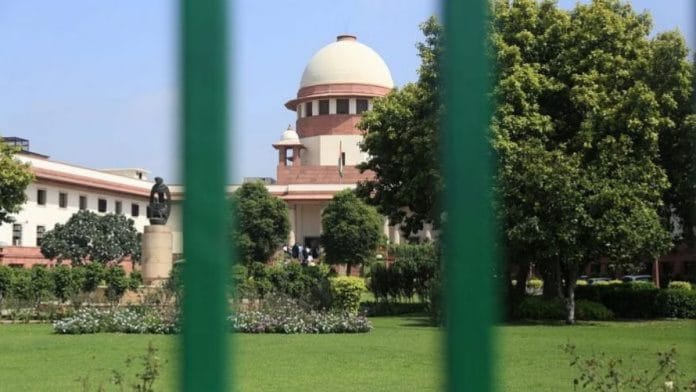New Delhi: Reminding Indians of their fundamental duty to renounce practices that are derogatory to the dignity of women, the Supreme Court Monday called for ending stigmatisation of breast-feeding in public spaces.
A bench led by Justice B.V. Nagarathna issued directives to states and the Centre to ensure breast-feeding in public spaces becomes an acceptable practice and nursing mothers are provided with privacy at these places.
The judgment, a short one running into 16 pages, delineated several provisions of the Constitution that deal with rights of women and healthy development of children. It discussed international conventions as well as the special Juvenile Justice Act (JJA), a welfare legislation that caters to the needs of minors.
ThePrint takes a look at interplay of these Articles that became the foundation for the top court judgment, underlining the State’s role in protecting constitutional rights of lactating mothers and infants under Article 21 (right to live with dignity).
Also Read: Unclean & ill-equipped—the ‘sorry state’ of women’s washrooms in Delhi’s district courts
What was the petition
The non-governmental organisation Maatr Sparsh An Initiative by Avyaan Foundation had moved the top court in 2022 seeking a direction to all states and the Centre to construct feeding rooms and child-care rooms and other facilities related to infants and mothers at public spaces.
This demand was kept with a view to ensure that the fundamental rights of a nursing mother and infants are protected.
The petition enumerated the importance of early child-care and mother’s milk for a child whose fundamental right included the right to be fed even at public spaces during infancy. Keeping in mind that women played a pivotal role in the growth of the nation, it was imperative that child-care facilities be available in public premises, the petitioner had submitted.
However, no concrete steps were taken by states and Centre to provide basic facilities at public spaces and create a conducive environment to maintain a mother’s dignity and privacy, which are integral to her fundamental right to live with dignity.
In response the central government informed the bench that in February this year it issued an advisory to all states and UTs regarding measures that ought to be taken in the interest of women in official places as well as public premises. These regulations, the Centre said, were issued having regard to Articles 14 and 15 (3) of the Constitution.
While Article 14 deals with equality before law, Article 15(3) allows the government to make laws that provide special consideration and protection for women and children. It is an exception to Article 15 that prohibits the State to discriminate on the grounds of religion, race, caste, sex or place.
Interplay of Articles
The first Article that came up for the top court’s consideration was Article 39(f), which requires the State to direct its policy towards the healthy development of children. Mentioned under the Directive Principles of State Policy (DPSP) this Article asks the State to direct its policy towards securing opportunities and facilities for children so that they develop in a healthy manner. Principles under the DPSP are fundamental to governance, and the State is required to apply them when making laws.
Principles enshrined in Article 39(f) dictate that while providing freedom and dignity to children, the state must ensure they are protected against exploitation, moral and material abandonment.
Article 47, also a part of DPSP, was the next key provision of the Constitution that weighed in the minds of the bench.
Under this the State has a duty to raise the level of nutrition and the standard of living of its people.
“The State shall regard the raising of the level of nutrition and the standard of living of its people and the improvement of public health as among its primary duties and, in particular, the State shall endeavor to bring about prohibition of the consumption except for medicinal purposes of intoxicating drinks and drugs of which are injurious to health,” noted Article 47.
The next Article that finds a mention in the judgment is a fundamental duty that every citizen is under obligation to carry out. Article 51A(e) speaks of a citizen’s duty to end practices that are derogatory to the dignity of women.
The bench emphasized this duty and said that over and above the duty of the State to facilitate the exercise of the right of nursing mothers to breast-feed their children, the citizens too have a duty to ensure that this practice in public spaces or at workplaces is not stigmatised.
The bench agreed with the Centre’s contention that its guidelines that were circulated to all states and UTs met the requirements under Articles 14 and 15 (3). It went on to direct the Centre to incorporate the advisory in the form of a reminder communication to all state chief secretaries.
(Edited by Amrtansh Arora)
Also Read: Quota for women, minorities & civil code — where India’s ‘founding mothers’ stood on key issues






